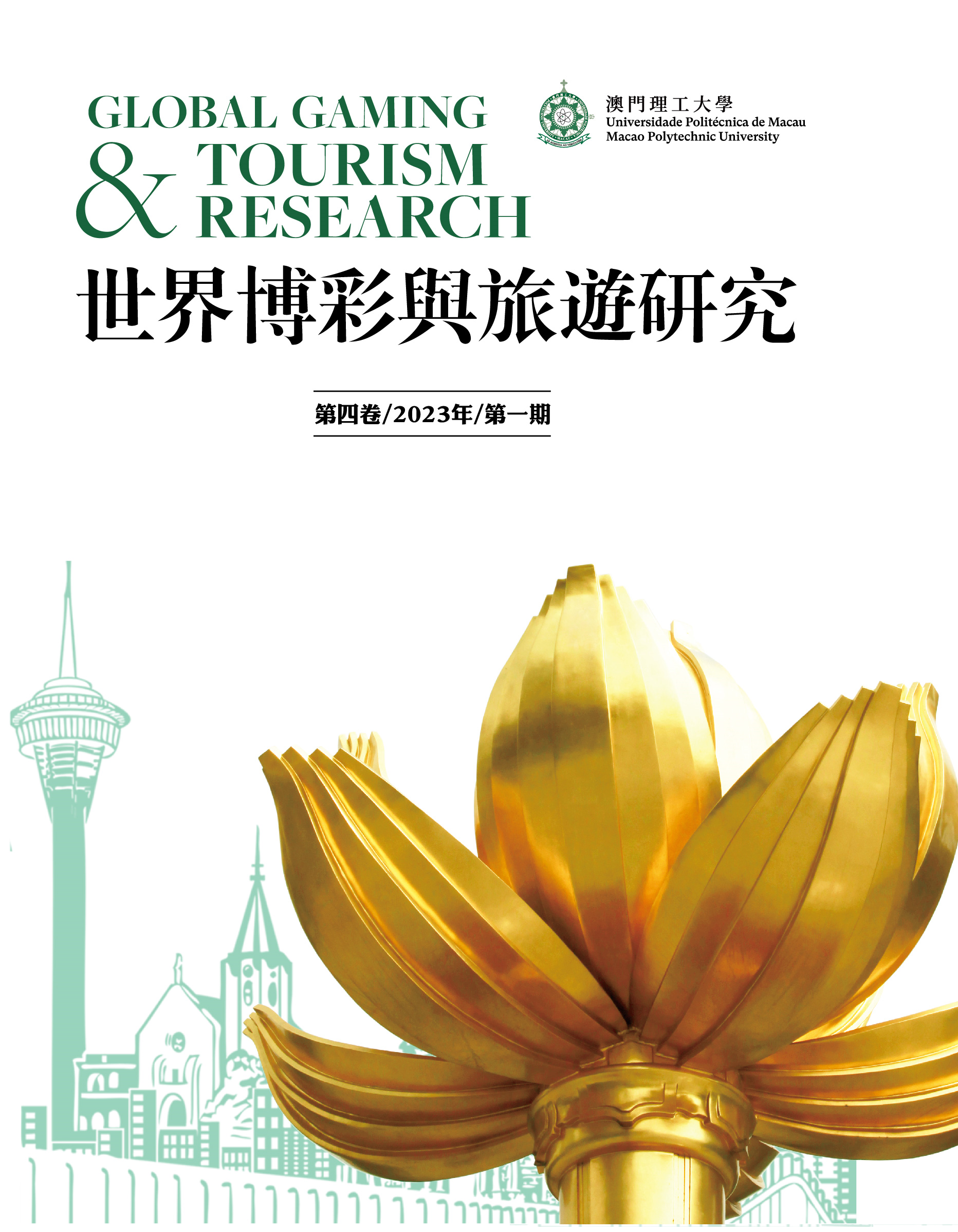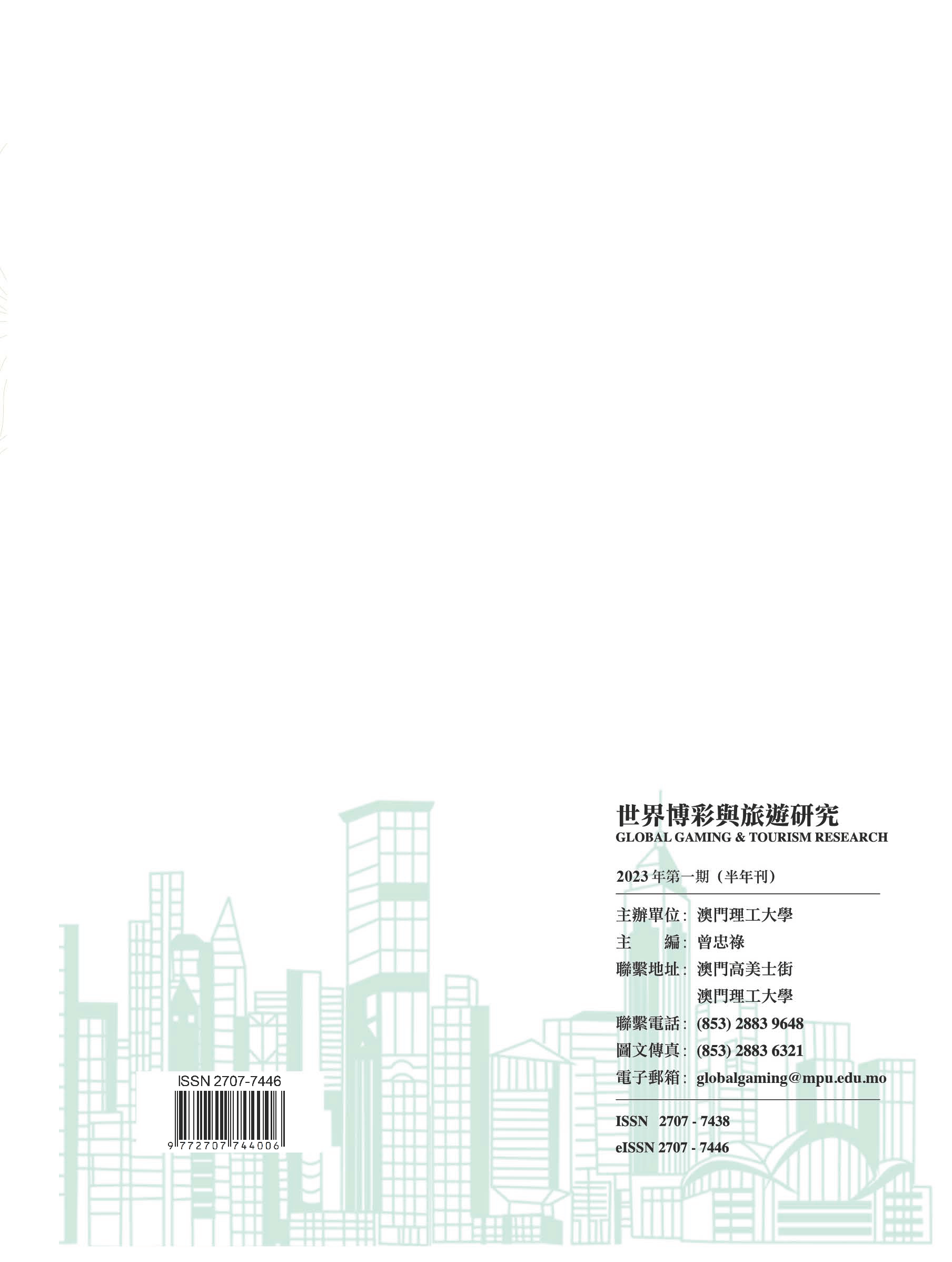Global Gaming and Tourism Research


|
ISSN: |
ISSN 2707-7438 eISSN 2707-7446 |
|---|---|
|
Period: |
Semi-annually |
|
Introduction: |
“Global Gaming & Tourism Research” aims to promote the sustainable development of the gaming and tourism industry. In addition to providing support for science-based decision-making across the public and gaming sectors, this academic journal seeks to serve as an exchange platform for gaming and tourism research work. “Global Gaming & Tourism Research” covers such key areas as the development trend of the Macao and global gaming industries, evolution and trend of consumer preference among gaming tourists, responsible gaming theory and practice, tourist behaviour theory and case studies, and tourist destination management theory and practice, etc. Contributions by experts, scholars and industry practitioners are welcome. |
|
|
|
Research on Non-gaming Diversificaiton Strategies of Gaming Companies in Macau
Economic diversification is a long-term concern of the Macao SAR government. Beginning in 2007, the government expected the gaming industry to contribute to this goal, and in 2015 the government put forward specific requirements for gaming companies. However, research on how gaming companies respond to government expectations and the strategic positioning of non-gaming diversification in gaming operations is lacking. By analyzing the annual reports of six gaming companies, this study reveals the importance and strategic positioning of Macau gaming companies on non-gaming diversification. The study found that from the opening of Macau's gambling rights to 2015, the gaming industry as a whole did not pay enough attention to non-gaming. The situation began to change in 2015. But only four companies have strategically placed non-gaming diversification. The non-gaming diversification strategic positioning of Macau gaming companies mainly focuses on attracting tourists, improving customer experience, and widening the distance from competitors.
|
Zeng Zhonglu |
|
Research on Evnvironmental, Social, and Governance and Related Non-Financial information Disclosure of Listed Gaming Companies in Macau
Environmental, social, and governance (ESG) reports issued by listed companies worldwide are the main tools for communication of economic, social, and environmental information between enterprises and stakeholders. Local regulatory bodies (such as local governments and stock exchanges) require listed companies to disclose ESG information in mandatory or voluntary practice. ESG issues vary across regions, industries and time. Listed companies choose to disclose ESG information for different reasons. This paper introduces the recent development of the Hong Kong ESG reporting standard, evaluates the importance of listed companies, climate-related financial disclosures, and third-party assurance of ESG. It also conducts a preliminary analysis of the disclosure status of the six major gaming companies in Macau, and makes corresponding recommendations. This study is beneficial for urging gaming companies to improve the quality and credibility of their environmental, social, and governance reports, enhancing the confidence of investors and stakeholders, and promoting the sustainable development ability of gaming companies.
|
Tiffany Cheng Han Leung |
|
A Group Path Analysis of Factors Influencing Chinese Welfare Lottery Sales———A Qualitative Comparative Analysis of Fuzzy Sets Based on 31 Provinces
Based on a group perspective, this study uses the fsQCA method to explore the interactive relationship between the factors affecting the sales volume of China Welfare Lottery, with a sample of 31 provinces (autonomous regions, municipalities directly under the central government). The study found that: (1) there are four paths to high sales volume of China Welfare Lottery, all of which are driven by economic level and population, and the development model can be summarized as “economy-population” double driven. In contrast to the development model of China Sports Lottery, China Welfare Lottery faces the problem of a single development path. (2) The vast majority of provinces are substitutive, and there are fewer promoting and dominant development paths, indicating that there is still a large space for improvement in the sales volume of welfare lottery in each province. (3)The factors that promote welfare lottery sales in the eastern and central-western regions differ greatly from region to region and from time to time.
|
Shi Wenwen, Yi Ze, Li Na |
|
A Study on the Construction of Responsible Gaming in China: Experience from Representative Lottery institutions Abroad
This article introduces the responsible gaming practices of six representative lottery institutions in Europe, the United States, and Asia, including LaFranaise des Jeux, the UK National Lottery, the New York Lottery, Singapore Pools, Taiwan Welfare Lottery, and the Hong Kong Jockey Club. The international lottery industry has practical experience related to responsible gaming in the following areas: setting up clear goals for responsible gaming, which include both “prohibiting minors from purchasing lottery tickets” and “preventing problem gambling”; focusing on simple lottery rules, low prices, and high prize money; taking multiple measures to protect lottery players and prevent problem gambling; and providing high-quality services to lottery players in sales, prize redemption, and inquiries. In terms of responsible gaming construction, the following suggestions are proposed to Chinese lottery institutions at all levels: to thoroughly implement responsible gaming goals and focus on provinces and cities with higher fiscal pressures; to develop security testing tools with independent intellectual property rights which are suitable for lotteries in China; to adjust lottery rules in a timely manner to meet the entertainment needs of lottery players; to strengthen the support and referral of problem players; and to further improve the quality of social responsibility reports according to feedback from all sectors of the society and independent assessment from third-party institutions.
|
Li Gang, Li Ke, Chu Lijuan, Chu Liping |
|
An Analysis of Current Situation and Trends in the Gambling Industry in the Philippines
This article gathers and integrates information about the gambling industry in the Philippines, drawing from government agencies, news media, journal column, and web resources. The purpose is to provide a systematic introduction to the industry, including its historical context, economic status, and development status and to analyse its latest development trends in the context of COVID19. Given the Philippines” proximity to Macau, there is an inevitable overlap in the source of visitors. Therefore, this article provides a comparative analysis of the attractiveness of the Philippines and Macao from four perspectives: transportation convenience, visa convenience, number of gambling facilities and gambling income, and tourism. Through a series of research analyses, this paper fills in research gaps on the Philippines’ s gambling industry while also providing a reference for Macao to better understand its neighbouring competitors.
|
Fu Jun |
|
|
|
Construction and Dissemination of Tourism Cultural Experience from the Perspective of the Theory of Cultural Memory
The new media communication context has brought a new impact on the construction and dissemination of tourism cultural experience. As the core component of tourism cultural experience, cultural memory is not only a key element in understanding the people place culture and identity of tourism destinations, but also has an important impact on the cultural marketing and experience of tourism destinations. From the theoretical perspective of cultural memory, this article explains the construction of tourist cultural experiences in tourist destinations as cultural memory venues, as well as the dynamic role that stories can play as a medium of cultural memory in the cultural transmission of tourist destinations. Storytelling in media space is potentially dynamic communication media that not only present local space and narrate local cultural connotations, but also continuously adjust tourists' local cultural perceptions and shape the way of people interact with each other in a diverse and interactive media communication context. As a place to be spoken and narrated, tourism destinations can use media stories to reshape locality and culture, and promote self production and cultural reproduction of tourism destinations.
|
Guo Yunjiao |
|
The Study of the Relationship among Tourists' Experiential Authenticity, Perceived Value, Satisfaction, and Storytelling Intention in Heritage Tourism: In the Case of Kaiping Diaolou and Village
In order to better understand the relationship between experiential authenticity and storytelling intention, based on the stimulus- organism -response model, this study takes the world cultural heritage Kaiping Diaolou and villages as the research case site, explores how tourists perceive experiential authenticity in the process of travel experience, as well as the mechanism of the tourist experiential authenticity and perceived value, satisfaction and storytelling intention. storytelling intention. The results of this study are as follows: (1) The original authenticity and interactive authenticity of tourists have a significant positive impact on emotional authenticity; (2) The original authenticity, interactive authenticity and emotional authenticity of tourists have a significant positive impact on perceived value; (3) Interactive authenticity, emotional authenticity, and perceived value have a significant positive impact on satisfaction, while the original authenticity of tourists has a significant negative impact on satisfaction; (4) Interactive authenticity, emotional authenticity, perceived value and satisfaction have a significant positive impact on storytelling intention, while the original authenticity of tourists has no impact on storytelling intention.
|
Rao Yun, Ivan Ka Wai Lai, Jose Weng Chou Wong |
|
Exploring the Relationship between Subjective Well-being, Emotional Solidarity, Place Attachment, and Revisit Intentin from the Perspective of Tourists: A Case Study of Macau
In the post-epidemic period, attracting tourists to visit Macau, increasing their revisiting intention, and promoting the recovery of the tourism industry has become the top priority for destination management organizations in Macau. This study aims to explore how the subjective well-being and emotional solidarity of tourists visiting Macau, mediated by place attachment, affect their revisiting intention in the post-epidemic period. In this study, the data of 360 questionnaires from tourists visiting Macau were analyzed by using SPSS24 and SmartPLS3.0 in a quantitative method. The results showed that both the subjective well-being and emotional solidarity of tourists have a positive impact on their revisiting intention, and place attachment plays a significant mediating role between tourists' subjective well-being and revisiting intention. This study re-examines the revisiting intention of tourists and its predictive factors, subjective well-being and emotional solidarity, and the results can provide a reference for relevant decision-making to the Macau government and promote the sustainable development of the tourism industry in Macau.
|
Tang Juan, Wang Yixuan, Song Baoyi, Li Zhengping |
|
A Review of Tourism Destination Resilience Research and Prospects for Building a Recovery Framework
Tourism destination management, destination governance, and destination resilience are closely related. Among them, tourism destination resilience has the shortest history as a research subject. However, within 20 years after experiencing natural disasters, political upheavals, pandemics, and considering the development of sustainable tourism, tourism destination resilience has received widespread attention from scholars. Based on literature review related to this topic, this paper sorts and discuss the concept, models and evaluation of destination resilience. More and more studies have recognized that effective destination management requires planned recovery policies. However, for tourism destination resilience, especially in terms of building a recovery framework, existing research has not provided a unified conclusion. This research has important research value and significance for the development and recovery of cross-regional and Greater Bay Area urban tourism industry.
|
YH Zhang, Shota |



